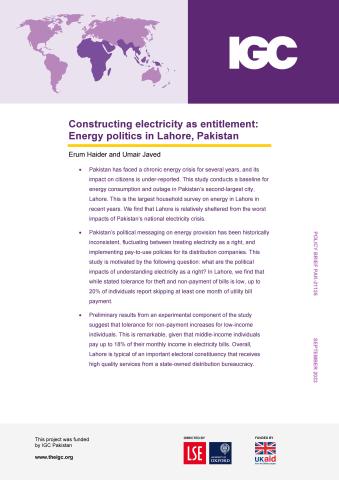Constructing electricity as entitlement: Energy politics in Lahore, Pakistan
-
Haider and Javed Policy brief September 2023
PDF document • 1.23 MB
- Pakistan has faced a chronic energy crisis for several years, and its impact on citizens is under-reported. This study conducts a baseline for energy consumption and outage in Pakistan’s second-largest city, Lahore. This is the largest household survey on energy in Lahore in recent years. We find that Lahore is relatively sheltered from the worst impacts of Pakistan’s national electricity crisis.
- Pakistan’s political messaging on energy provision has been historically inconsistent, fluctuating between treating electricity as a right, and implementing pay-to-use policies for its distribution companies. This study is motivated by the following question: what are the political impacts of understanding electricity as a right? In Lahore, we find that while stated tolerance for theft and non-payment of bills is low, up to 20% of individuals report skipping at least one month of utility bill payment.
- Preliminary results from an experimental component of the study suggest that tolerance for non-payment increases for low-income individuals. This is remarkable, given that middle-income individuals pay up to 18% of their monthly income in electricity bills. Overall, Lahore is typical of an important electoral constituency that receives high quality services from a state-owned distribution bureaucracy.



